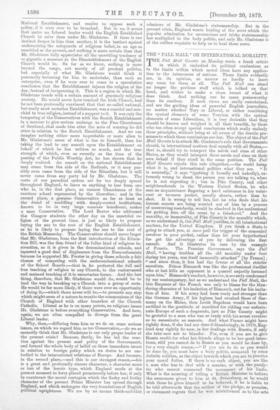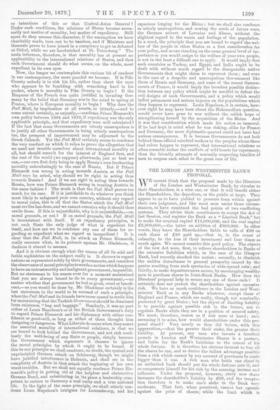THE "PALL MALL " ON INTERNATIONAL MORALITY. T HE Pall Mall Gazette
on Monday wrote a frank article in which it embodied its political confessions as to the limits within which moral ideas have any applica- tion to the intercourse of nations. Those limits evidently are, in its opinion, so narrow as hardly to leave any room for them at all. The Pall Mall can stand no longer the perilous stuff which is talked on that head, and wishes to make a clean breast of what it does think. And nothing can be more praiseworthy than its candour. If such views are really entertained, and are the guiding ideas of powerful English journalists, no matter whether Tory or Liberal, or rather combining the cynical elements of some Toryism with the cynical elements of sonic Liberalism, it is very desirable that they should be known and weighed in all their breadth, by those who too often accept special conclusions which really embody these principles, without being at all aware of the drastic pre- misses to which these conclusions are due. The object of the Pall Mall Gazette is to attack Mr. Gladstone's rule that Governments should, in international matters deal equally with all States,— that is, should try to interpret the needs and aims of other States, as they would interpret these needs and aims on their own behalf if they stood in the same position. The Pall Mall Gazette rejects this rule altogether,—the world being what it is, and international politics what they are. " It is assuredly," it says "(putting it broadly and nakedly), ex- tremely wrong to shoot the person you are talking to, when he is not expecting it ; but in Pike County, and other neighbourhoods in the Western United States, he who sees an acquaintance fingering a hard substance in his waist- coat or trousers pocket, usually shoots, rather than be shot. It is wrong to tell lies, but he who finds that his inmost secrets are being worried out of him by a process of unswerving mendacity, would be absolved in the confessional for putting him off the scent by a falsehood." And the morality, or immorality, of Pike County is the morality which, as we understand it, the Pall Mall justifies, in all international matters, for the United Kingdom. If you think a State is going to attack you, at once pull the trigger of the concealed revolver in your pocket, rather than let your hypothetical foe get the advantage of you by delivering the first assault. And it illustrates its case by the example of Prussia. The Prussian Government, says the Pall Mall, " having trodden all the old morality under foot during ten years, was itself immorally attacked" [by France] ; " and since then, it has had the favour of all the stricter moralists. Prince Bismarck was like the professional duellist who at last kills an opponent in a quarrel unjustly fastened upon him." Bismarck's conduct, however, is severely condemned by our contemporary, but as we understand the Pall Mall, the late Emperor of the French was only to blame for the blun- dering character of his imitation of Bismarck, not for his imita- tion of him. If his army had been ready and stronger than the German Army, if his legions had crushed those of Ger- many on the Rhine, then Louis Napoleon would have been entitled to the gratitude of mankind for ridding our unfortu- nate Europe of such a desperado, just as Pike County might be grateful to a man who was so ready with his secret revolver as to assassinate an assassin. And what France might have rightly done, if she had not done it blunderingly, in 1870, Eng- land may rightly do now, in her dealings with Russia, if only she take care not to blunder. For, even if you are to give Russia credit for what her friends allege to be her good inten- tions, still you cannot do to Russia as you would be done by, for a very simple reason,—" If you are to do as you would be done by, you must have a body politic, animated by some definite volition, as the object towards which you are to practise your moral duties. If there is no such object, you are like a man who has to deal with a maniac, or with the paraly- tic who cannot command the movement of his limbs. What is the meaning of telling a British Minister to believe the assurances given to him at St. Petersburg, as he would wish those he gives himself to be believed, if he is liable to be told afterwards that the author of the pledge, or promise, or statement regrets that he was misinformed as to the acts or intentions of this or that Central-Asian General Under such conditions, the relations of States become neces- sarily not matter of morality, but matter of expediency. Still more do they assume this character, if the assumption we have charitably made, turn out to be baseless, and if Ministers and Generals prove to have joined in a conspiracy to get us defeated at Cabul, while we are hoodwinked at St. Petersburg." The main inference, therefore, is that morality has at present no applicability to the international relations of States, and that each Government should do what seems, on the whole, most expedient in its own eyes. Now, the longer we contemplate this curious bit of candour in our contemporary, the more puzzled we become. If in Pike County nobody is to risk his life, rather than shoot the man who appears to be fumbling with something hard in his pocket, where is morality in Pike County to begin ? If the Emperor of the French was quite justified in invading Ger- many by the belief that Germany was in the mind to spring at France, where is European morality to begin ? Why does the Pall Mall, by implication at all events, so bitterly,—and to some extent certainly, so unjustly,—condemn Prince Bismarck's own policy between 1864 and 1870, if expediency was the only applicable principle, and that expediency were well calculated f If the fact that some Governments are utterly unscrupulous is to justify all other Governments in being utterly unscrupulous too, the prospect of improvement may be adjourned to the Greek Calends. Yet the Pall Mall certainly seems to condemn the very conduct on which it relies to prove the allegation that we need not trouble ourselves about international morality at all, but should consult for the interest of England first, and the rest of the world (we suppose) afterwards, just as best we can,—our own first duty being to apply Russia's own freebooting morality unhesitatingly to the ease of Russia. But if Prince Bismarck was wrong in acting towards Austria as the Pall Mall says he acted, why should we be right in acting thus towards Russia ? And if we are right in acting thus towards Russia, how was Prince Bismarck wrong in treating Austria in the same fashion ? The truth is that the Pall Mall proves too much for its case. If it is justifiable to do whatever you think most likely to safeguard your own country, without any regard to moral rules, this is all that the States which the Pall Mall most reviles has done, and we cannot conceive why it should thus revile them. If this is unjustifiable, why is it unjustifiable,—on moral grounds, or not ? If on moral grounds, the Pall Mall is inconsistent with itself. If on expediency principles, is not each State the only judge of what is expedient for itself, and how are we to condemn any one of them for re- garding as expedient what we regard as inexpedient ? It is clear that the Pall Mall, in its attack on Prince Bismarck, really assumes what, in its polemic against Mr. Gladstone, it declares it absurd to assume.
And it is obvious enough what the source of all its acid and feeble sophistries on the subject really is. It chooses to regard nations as represented solely by their governments, and considers the observance of moral principles towards a nation which happens to have an untrustworthy and malignant government, impossible. But no statesman in his senses ever for a moment maintained that you are always bound to do to every government,—no matter whether that government be bad or good, cruel or benefi- cent,—as you would be done by. Mr. Gladstone certainly is the last statesman in the world to be accused of such a principle, when the Pall Mall said its friends have never ceased to revile him for maintaining that the Turkish Government should be dismissed from existence, " bag and baggage." Similarly, it was no part either of Louis Napoleon's or of the British Government's duty to regard Prince Bismarck and his diplomacy with either con- fidence or good-will, so long as either of them thought him designing or dangerous. What Liberals do mean when they assert the essential morality of international relations, is that we are bound to look behind the Government, and not risk need- lessly the well-being of any State or people, simply because the Government which represents it chooses to ignore the moral principles by which it ought to be bound. If this be our principle we shall condemn, no doubt, the cynical and unprincipled German attack on Schleswig, though wo might have justified interference in Holstein, and shall see in the complicity of Austria in that attack the beginning of her own worst troubles. But we shall not equally condemn Prince Bis- marck's policy in getting rid of the helpless and obstructive German Bund, and substituting in its place a leadership com- petent to restore to Germany a real unity and a true national life. In the light of the same principle, we shall utterly con- demn Louis Napoleon's intrigues for Luxembourg, and his rapacious longing for the Rhine ; but we shall also condemn as utterly unscrupulous, and sowing the seeds of future wars, the German seizure of Lorraine and Alsace, without the slightest regard to the wants and feelings of the population. In a word, the principle that you are bound to regard the wel- fare of the people in other States as a first consideration for your policy, and as one standing on the same general level of im- portance as you would assign to the welfare of your own people, is not• in the least a difficult one to apply. It would imply that such countries as Turkey, and Egypt, and India ought to be dealt with without much regard to the disreputable native Governments that might claim to represent them ; and even in the case of a despotic and unscrupulous Government like those of Russia and Germany, and some of the recent Govern- ments of France, it would imply the broadest possible distinc- tion between any policy which might be needful to defeat the evil designs of such Governments, and a policy which would inflict permanent and serious injuries on the populations which they happen to represent. Louis Napoleon, it is certain, how- ever right he may have been about the Hohenzollern question, would never have gone to war without the selfish hope of strengthening herself by the acquisition of the Rhine. And it was that consideration which made his action so immoral. If he had kept in mind what he was risking, alike for France and Germany, the mere diplomatic quarrel could not have had serious consequences. It is because Governments do not look behind these official mischief-makers to the peoples whom these .bad rulers happen to represent, that international relations so often resemble rather the conflicts of wild boasts for supremacy, than the friendly attempts of mutually respecting families of men to surpass each other in the great race of life.







































 Previous page
Previous page